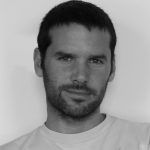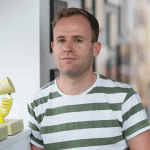DESIGN PANEL
What does Research through Design as an activity mean to researchers? Like all forms of academic enquiry, design-led research can give rise to new knowledge. But unlike disciplines where research may lead to quantifiable data, the forms of knowledge arising from creative practice are often embedded in artefacts and processes. Indeed, processes have in recent times gained an ascendancy in knowledge value equal to or often greater than the actual outcomes. The making narratives used by Studio Swine and Max Lamb, for example, are certainly discussed as much as the outcomes. These design-led processes can be intuitive, impulsive, or tactile, sometimes all three and lead to a type of tacit knowledge which can at times be difficult to unpick and unravel.
So how do we give value to our research narrative as one that is meaningful to a wider audience? In other words, so what?
Our panel of academics and practitioners, Kristina Andersen, Tobie Kerridge, James Auger, Sarah Kettley, chaired by Craig Martin, discussed and debated these questions, and more posed by the audience, in what was an hour of stimulating debate and argument on this key topic. More about our panel members:
Kristina Andersen

Kristina Andersen is a designer and researcher based at STEIM (Studio for Electro-Instrumental Music) in Amsterdam and KTH in Stockholm. She works with electronics and reclaimed materials to create unusual devices and experience, but her work is increasingly concerned with how we can allow each other to imagine our possible technological futures through the making of non-functional exploratory objects. In these objects, several planes collide: the possible, the unknown, the feared and the desired. They are informed by concern and longing, but built from candy and cardboard and other increasingly ridiculous materials, chosen for their lack of permanence and accuracy. She works as principal researcher and expert reviewer in various EU contexts, teaches the combined MA between STEIM and Sonology in Den Haag as well as maintaining her own practice and taking part in the research group: Making Things Public at the Rietveld Academy of the Arts.
James Auger

James Auger is a designer, researcher and lecturer whose work examines the social, cultural and personal impacts of technology and the products that exist as a result of its development and application. On graduating from Design Products (MA) at the Royal College of Art in 2001 James moved to Dublin to conduct research at Media Lab Europe (MLE) exploring the theme of human communication as mediated by technology. Between 2005 and 2015 James was part of Design Interactions at the RCA, teaching on the MA programme and continuing his development of critical and speculative approaches to design and technology, completing his PhD on the subject in 2012. James recently moved to the Madeira Interactive Technologies Institute (M-ITI) in Portugal. His new research explores the potential of the Island as an experimental living laboratory through a combination of fictional, factual and functional multi-scale energy-related proposals and projects.
Sarah Kettley

Sarah Kettley is Reader in Relational Design within the Product Design subject area at Nottingham Trent University. Her research is concerned with how we design networks of things for networks of people. This includes questions about philosophy, ethics and methodologies in participatory practices, and brings together fields such as craft theory, design for mental health and wellbeing, and design anthropology. She is a council member of the Design Research Society, and convenes the tentSIG special interest group in tangible, embedded and networked technologies. Her practice-led research resulted in the first user-centred application of the ubiquitous computing platform, Speckled Computing in 2005. She currently leads the EPSRC project, An Internet of Soft Things.
Tobie Kerridge

Tobie is a lecturer in Design at Goldsmiths, and from 2003 has worked as a design researcher with the Interaction Research Studio and as a Helen Hamlyn Research Associate. Projects have been supported by Philips Design, Intel and France Telecom, and funded by UK and EU funding councils. He led two EPSRC funded public engagement projects, Biojewellery with Nikki Stott and Ian Thompson at Guys Hospital, and Material Beliefs as a visiting researcher with the Institute of Biomedical Engineering at Imperial College. His PhD thesis discussed Material Beliefs as a case where speculative design and upstream public engagement became mixed up. Tobie is committed to taking a collaborative and speculative approach to design, and making empirical accounts of that practice. Read more at Tobie’s Departmental webpage and Personal website.
Craig Martin

Craig Martin is Senior Lecturer in Design Cultures in the School of Design at The University of Edinburgh. He is a cultural geographer and cultural theorist with a particular interest in design cultures. His research broadly addresses ‘design geographies’ – the interplay between cultural geography and the social forces of mundane design, with a particular focus on design mobilities, and illicit design. Recent publications include the sole-authored book Shipping Container (Bloomsbury Academic, 2016), and chapters in Cargomobilities (Routledge, 2015), and Mobilising Design (Routledge, 2017). He is currently at work on his next book Deviant Design and Illicit Innovation for Bloomsbury Academic.






